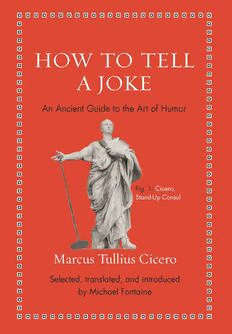
How to Tell a Joke: An Ancient Guide to the Art of Humor PDF
Preview How to Tell a Joke: An Ancient Guide to the Art of Humor
HOW TO TELL A JOKE ancient wisdom for modern readers How to Tell a Joke: An Ancient Guide to the Art of Humor by Marcus Tullius Cicero How to Keep an Open Mind: An Ancient Guide to Thinking Like a Skeptic by Sextus Empiricus How to Be Content: An Ancient Poet’s Guide for an Age of Excess by Horace How to Give: An Ancient Guide to Giving and Receiving by Seneca How to Drink: A Classical Guide to the Art of Imbibing by Vincent Obsopoeus How to Be a Bad Emperor: An Ancient Guide to Truly Terrible Leaders by Suetonius How to Be a Leader: An Ancient Guide to Wise Leadership by Plutarch How to Think about God: An Ancient Guide for Believers and Nonbelievers by Marcus Tullius Cicero How to Keep Your Cool: An Ancient Guide to Anger Management by Seneca How to Think about War: An Ancient Guide to Foreign Policy by Thucydides How to Be Free: An Ancient Guide to the Stoic Life by Epictetus How to Be a Friend: An Ancient Guide to True Friendship by Marcus Tullius Cicero How to Die: An Ancient Guide to the End of Life by Seneca How to Win an Argument: An Ancient Guide to the Art of Persuasion by Marcus Tullius Cicero How to Grow Old: Ancient Wisdom for the Second Half of Life by Marcus Tullius Cicero How to Run a Country: An Ancient Guide for Modern Leaders by Marcus Tullius Cicero How to Win an Election: An Ancient Guide for Modern Politicians by Quintus Tullius Cicero HOW TO TELL A JOKE An Ancient Guide to the Art of Humor Marcus Tullius Cicero Selected, translated, and introduced by Michael Fontaine PRINCE TON UNIVERSITY PRESS PRINCE TON AND OXFORD Copyright © 2021 by Princet on University Press Prince ton University Press is committed to the protection of copyright and the intellectual property our authors entrust to us. Copyright promotes the prog ress and integrity of knowledge. Thank you for supporting free speech and the global exchange of ideas by purchasing an authorized edition of this book. If you wish to reproduce or distribute any part of it in any form, please obtain permission. Requests for permission to reproduce material from this work should be sent to permissions@press .p rinceton . edu Published by Prince ton University Press 41 William Street, Princet on, New Jersey 08540 6 Oxford Street, Woodstock, Oxfordshire OX20 1TR press . princeton . edu All Rights Reserved Library of Congress Cataloging-in-Publication Data Names: Cicero, Marcus Tullius, author. | Fontaine, Michael, editor, translator, writer of supplementary textual content. | Cicero, Marcus Tullius. De oratore. Liber 2.216–290. English (Fontaine) | Cicero, Marcus Tullius. De oratore. Liber 2.216–290. Latin (Fontaine) | Quintilian. Institutiones oratoriae. Liber 6. Caput 3. English (Fontaine) | Quintilian. Institutiones oratoriae. Liber 6. Caput 3. Latin (Fontaine) Title: How to tell a joke : an ancient guide to the art of humor / Marcus Tullius Cicero ; selected, translated, and introduced by Michael Fontaine. Other titles: Ancient wisdom for modern readers. Description: Princeton ; Oxford : Princeton University Press, 2021. | Series: Ancient wisdom for modern readers | Includes bibliographical references. | In English translation with original Latin text; introduction and epilogue in English. Identifiers: LCCN 2020044600 (print) | LCCN 2020044601 (ebook) | ISBN 9780691206165 (hardcover) | ISBN 9780691211077 (ebook) Subjects: LCSH: Wit and humor—Early works to 1800. | Joking—Early works to 1800. Classification: LCC PA6308.D6 F66 2021 (print) | LCC PA6308.D6 (ebook) | DDC 875/.01—dc23 LC record available at https://lccn.loc.gov/2020044600 LC ebook record available at https://lccn.loc.gov/2020044601 Editorial: Rob Tempio and Matt Rohal Production Editorial: Sara Lerner Text and Jacket Design: Pamela L. Schnitter Production: Erin Suydam Publicity: Jodi Price and Amy Stewart Copyeditor: Jennifer Harris Jacket Image: Cicero / Photo: Shutterstock, adapted by ajibson This book has been composed in Stempel Garamond Printed on acid- free paper. ∞ Printed in the United States of Ameri ca 1 3 5 7 9 10 8 6 4 2 δοκεῖ δὲ καὶ γέλωτος οἰκεῖος ὁ Κικέρων γεγονέναι καὶ φιλοσκώπτης. Cicero was seemingly addicted to laughter and to being a smartass. —p lutarch, comparison of dem ost hen es and cicero (1.6) CONTENTS Acknowl edgments ix Introduction xi How to Tell a Joke 1 CICERO On the Art of Humor 142 QUINTILIAN Epilogue 271 Notes 275 Bibliography and Further Reading 289 ACKNOWLE DGMENTS Jocus est sapientia magna, et jocus interdum plus gravitate valet. A joke is great wisdom, and a joke sometimes outwits severity. —m atthew delius, the art of joking (4.399–400) Delius is right, so it is a plea sure to thank Rob Tempio for letting me play Perkeo in this series once more. I am also grateful to Valzhyna Mort, Mark Saltveit, Tessy Schlosser, and Joel Stein for sharing their insights on comedy or trans- lation with me, and to the two referees whose excellent suggestions made every thing better. On a personal note, my heartfelt thanks go to Xiomara Gómez for her constant support, ix ACKNOWL EDGMENTS and, of course, to Ava, Jake, and Alyssa. Dur- ing the coronavirus lockdown of 2020, they were my first audience, and second, and third. . . . I thank them for humoring me. Last, I would like to acknowledge the advice and encouragement of George Thomas, who writes u nder the name Quintus Curtius, with a proverb he will recognize: Quam quisque norit artem, in hac se exerceat. We each o ught ply the trade that we know best. Here I go. Ithaca, New York x
